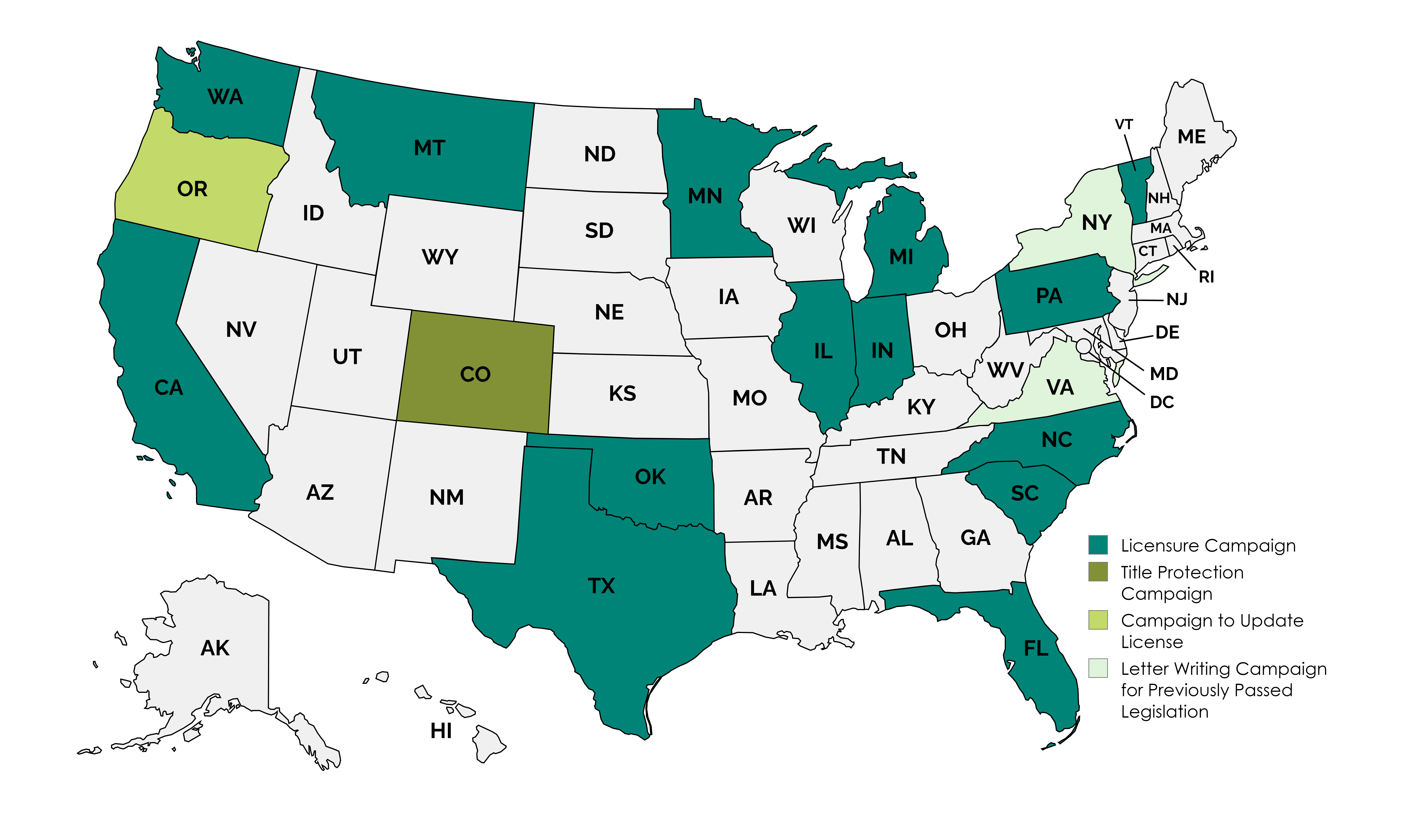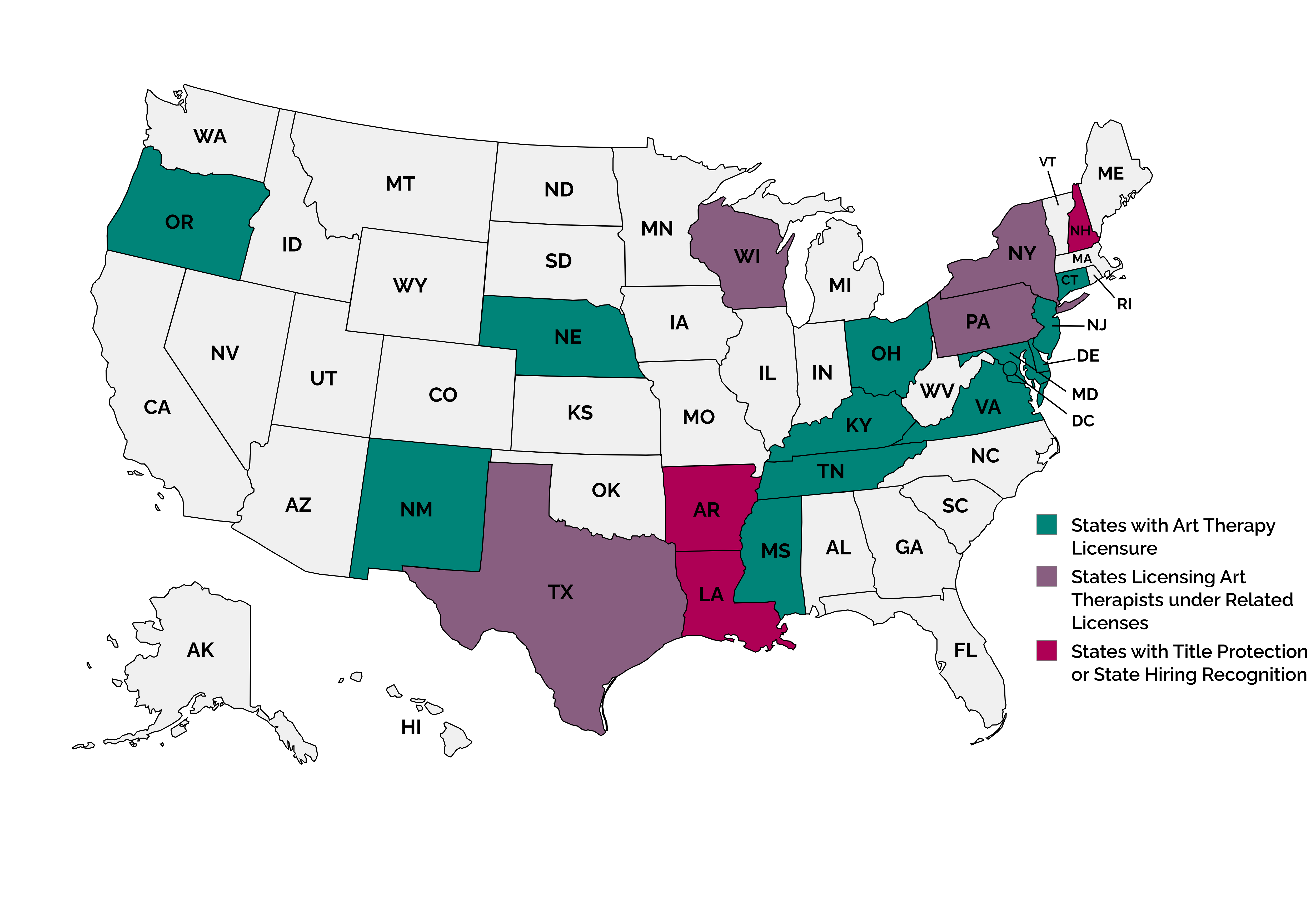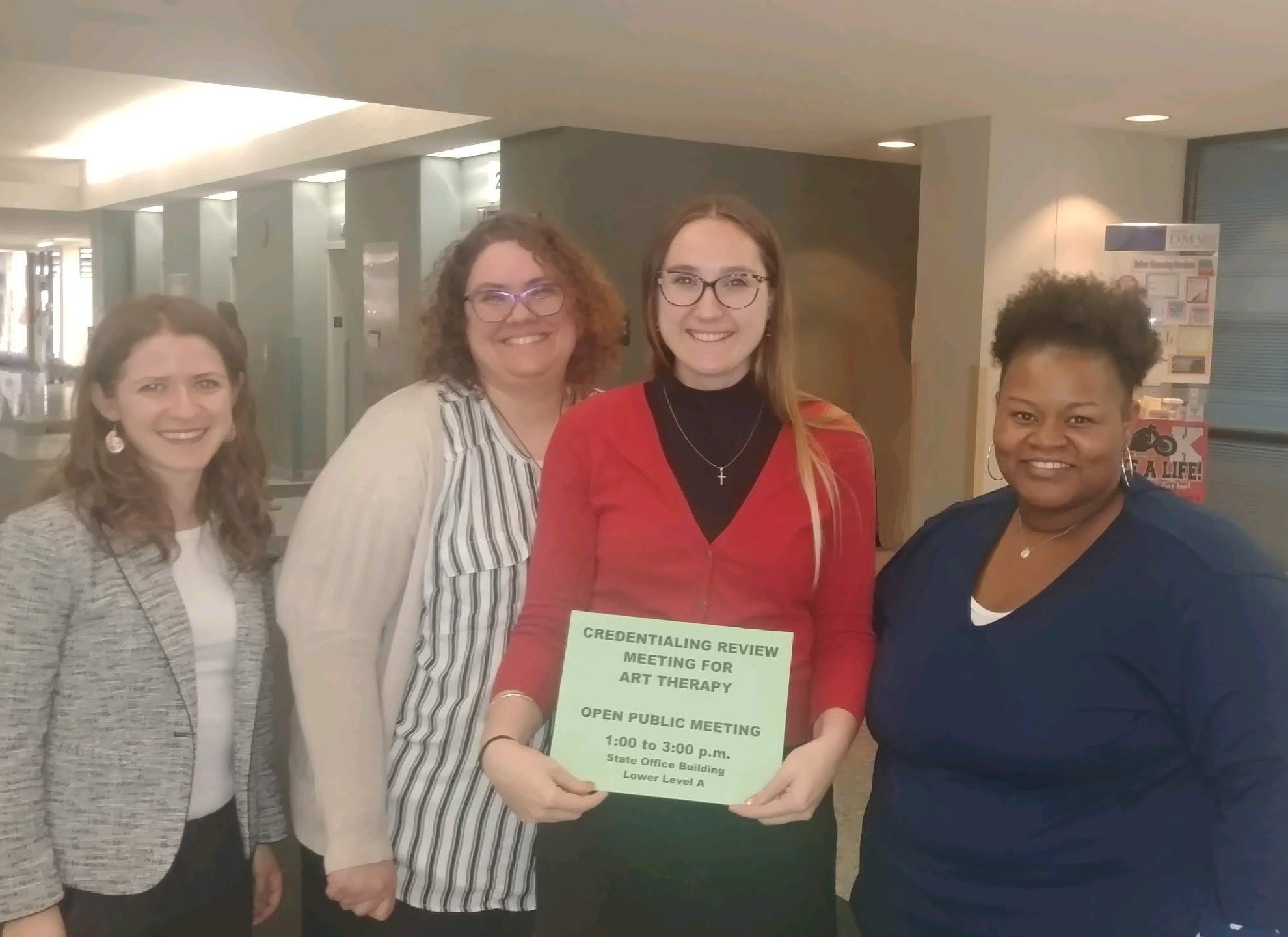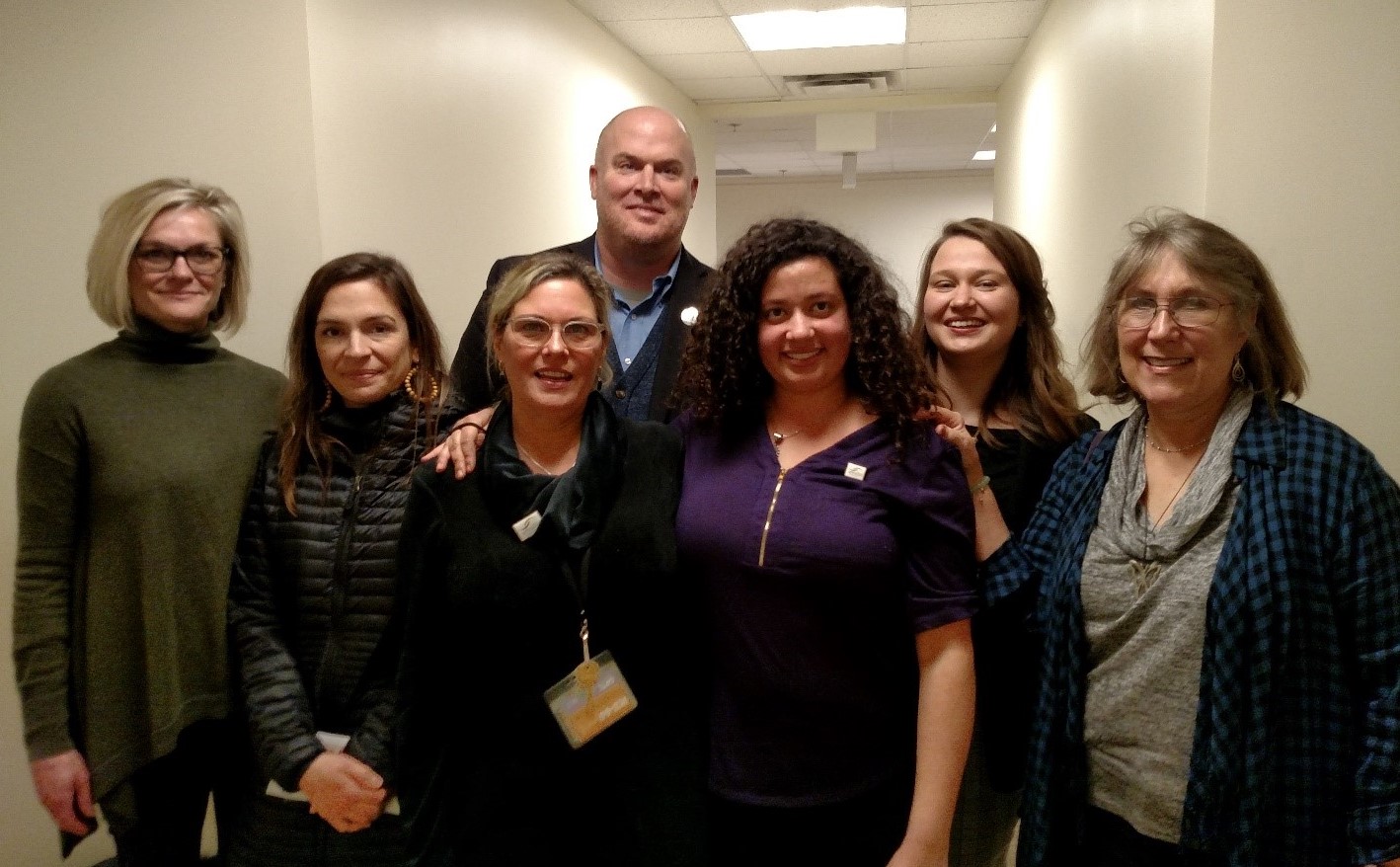STATE ADVOCACY
With our chapters and mental health partners, AATA works to raise public awareness about art therapy, make services more accessible to communities, and promote legislative and regulatory initiatives that advance the profession and support the well-being of art therapists and the clients they serve.
Art therapy is now a regulated mental health profession in 15 states and the District of Columbia. Art therapists hold professional art therapy licenses in Connecticut, Delaware, the District of Columbia, Kentucky, Maryland, Mississippi, New Jersey, New Mexico, Oregon, Tennessee, and Virginia. They are regulated under related professional licenses in Texas, New York, Pennsylvania, Wisconsin, and Utah. Additionally, art therapists are recognized for purposes of state hiring and/or title protection in Arizona, Louisiana, and New Hampshire.
While art therapists have relied on licensure through related allied mental health professions in the past, the window for that option is closing rapidly. Now more than ever, art therapists need to rally to gain art therapy licensure to ensure professional sustainability for generations to come. AATA works with our state and local chapters in securing licenses in their states, obtain insurance reimbursement, as well as protect the art therapy profession from the threat of deregulation, which would take away the public’s ability to discern qualified practitioners from bad actors.
We want to make it as easy as possible to learn more and join the campaign in your state.
- Get started by watching this virtual advocacy session where you’ll hear about the basics of advocacy from art therapists who have been advocating for the profession for decades.
- Read AATA Past President Margaret Carlock Russo’s post on the importance of advocacy and licensure.
- Reach out to your local chapters and Meredith Ashley, AATA Policy and Communications Coordinator, at mashley@arttherapy.org or (703) 567-9701 to learn about local initiatives or to get one started. Joining local advocacy initiatives can be a great way to connect with other art therapists around you and have a positive impact on your community by expanding access to life changing mental health care!
CURRENT ACTIVE LEGISLATION

States with Active Legislation:
- Michigan: Art Therapists in Michigan are advocating for HB4514, introduced by Representative Markkanen, which would provide licensure for art therapists in Michigan. They are also advocating for HB4513, introduced by Representative Paiz, which would amend the Mental Health Code to include licensed clinical art therapists as one of the professions required to report suspected abuse, neglect, or exploitation of patients to the Department of Health and Human Services, similar to the existing requirements for other mental health professionals.
States with Active Advocacy Campaigns:
- California: Members of the Northern and Southern Chapters of California’s Art Therapy Associations had their first meeting with legislators about sponsoring licensure legislation they plan to introduce in 2025.
- Colorado: The Colorado Art Therapy Association is working to educate lawmakers on the power of art therapy, find sponsors, and prepare their sunrise review application for title protection. They are encouraging organizations to sign onto their advocacy pledge.
- Florida: The Florida Art Therapy Association is preparing to reintroduce licensure legislation originally introduced in 2023. They are encouraging rt therapists in the state to write their lawmakers about the need for licensure.
- Illinois: The Illinois Art Therapy Association is working to reintroduce the licensure bill originally introduced in 2024. They are actively encouraging art therapists and those who have benefitted from art therapy to provide testimonials and write their lawmakers and encourage them to co-sponsor the bill in 2025.
- North Carolina: The North Carolina Art Therapy Association is working to add art therapy as a licensed profession under the Healing Arts Commission Bill which will be reintroduced this fall. The bill would license a variety of “healing arts” and currently includes music therapy, reflexology, and homeopathic doctors.
- Texas: The North Texas Art Therapy Association and Dallas Art Therapy are looking for sponsors for a licensure bill to be introduced in 2025.
- Virginia: The Virginia Art Therapy Association is continuing to push the Governor to sign the Art Therapy regulations after their licensure legislation passed on March 11, 2020. Read about how you can help the regulations get passed in VATA member Gretchen Grave’s blog post.
- Vermont: The Vermont Art Therapy Association is working with the Office of Professional Regulation as contributing members of a study mandated by legislature to streamline mental health licensure, remove barriers to access for mental health professionals, and address issues related to supervision of mental health professionals. This study will pave the way for the chapter to introduce licensure legislation.
- Washington: The Evergreen Art Therapy Association is working to find sponsors and finalize their sunrise review for submission to begin the legislative process for providing art therapy licensure in Washington state.
Recent Successes:
- Nebraska: Art Therapists in Nebraska officially won licensure in their state after LB605 was signed by Governor Pillen on March 11, 2024
- Ohio: The Buckeye Art Therapy Association has won art therapy licensure for the state of Ohio after Governor DeWine signed HB33 on July 4, 2023.
- New York: The New York Art Therapy Association’s advocacy for A9018, which would authorize licensed creative arts therapists to bill Medicaid directly for their services, has passed both the House and Senate and is awaiting approval from the Governor.
Why Advocate for Licensure?
Achieving art therapy licensure is a core part of our mission to advance art therapy as a regulated mental health and human services profession, plus, licensure provides numerous protections and benefits for the public and for art therapists.
1.
Protecting the Public
Without licensure, it can be difficult for members of the public to identify a properly trained art therapist. Licensure protects the public from harm, misrepresentation, and fraud.
2.
Protecting Title and Scope of Practice
Licensure provides legal mechanisms to counteract the large number of practitioners working outside of their scope of practice and organizations claiming to offer “art therapy training.” It can also help protect art therapists from being accused of infringing on the scope of practice of other professions.
3.
Sustaining the Profession
In states without specific art therapy licenses, art therapists are typically required to obtain a related mental health license (most often in counseling) along with credentials from the Art Therapy Credentials Board (ATCB) in order to practice. However, recently, graduates of art therapy programs are facing increased challenges in gaining counseling licenses due to shifts in the counseling field. Art Therapy licensure guarantees an avenue to practice for graduates unable to earn other licenses.
4.
Sustaining the Profession
Licensure is the first step to insurance reimbursement, and when government-issued licenses are required, hourly wages increase by 7.5% on average. Licensure can make the field more financially feasible for both budding art therapists and members of the public seeking art therapy services.
WHICH STATES HAVE LICENSES?

STATE ART THERAPY LICENSES
Connecticut
Delaware
District of Columbia
Kentucky
Maryland
Mississippi
New Jersey
New Mexico
Nebraska
Certified Art Therapist License
Oregon
Ohio
Licensed Professional Art Therapist (LPAT)
Tennessee
Virginia
STATES LICENSING ART THERAPISTS UNDER RELATED LICENSES
New York
Pennsylvania
Texas
Wisconsin
STATES RECOGNIZING ART THERAPISTS FOR PURPOSES OF STATE HIRING AND/OR TITLE PROTECTION
Arizona
Louisiana
New Hampshire
Login to the MyAATA portal or become an AATA member to gain access to resources that can help you navigate the licensure process. This includes a list of regulatory boards and their contact information as well as a state-by state list of alternative licenses in related professions, such as the Marriage and Family Therapy License (MFT) and the Licensed Professional Counselor (LPC) license. Also find breakdowns of licensing and practice requirements in each state including examinations, clinical hours, fees, and supervision and portability rules.
WHAT TYPES OF BILLS ARE INTRODUCED?
The issues addressed in art therapy legislation depend on the political landscape of a given state, its licensing and regulatory structure, and the unique challenges confronting local art therapists. Some of the issues addressed in recent state bills include:
- Licensure and regulation of art therapists
- Practice and title protection for licensed or credentialed art therapists
- Guidelines for hiring art therapists by State programs
- Insurance reimbursement for art therapy services
WHAT ARE THE AATA’S RECENT LEGISLATIVE ACCOMPLISHMENTS FOR THE PROFESSION?
The AATA is working on advocacy efforts with 19 states, including eight states with currently active legislative initiatives. For more details on each bill, follow the links to the announcement articles in Art Therapy Today:
How We Secured Licensure in Nebraska: Building Relationships
(August 20, 2024)
The Nebraska Art Therapy Licensure Coalition was created in 2017 after then recent social work graduate and soon-to-be George Washington post-Masters art therapy student, Jenelle Miller, asked AATA Executive Director Cynthia Young a simple question: How one might go about securing licensure for art therapists in Nebraska?
Laura’s Story: Why We Need Therapy Licensure
(August 21, 2024)
When Laura finally graduated, she was beyond thrilled to be a full-fledged art therapist. While we would have been delighted to have her as part of the team at the Art Therapy Institute, it unfortunately had to close permanently—and she began searching for an art therapy position in North Carolina. At this point, Laura faced an even bigger challenge: She learned that the North Carolina Board for Licensed Clinical Mental Health Clinicians were now requiring people applying for the associate licensed clinical mental health clinician’s license (LCMHC-A) to have graduated from a CACREP-accredited institution. And while most art therapy programs are CAAHEP accredited, very few have CACREP accreditation.
Write a Letter to Help us License Virginia Art Therapists
(May 21, 2024)
This April our chapter sent out an email to call on all Art Therapists in Virginia, asking them to do just that. You may have even received our letter yourself! We are excited to report that over 50 letters have been sent, but the work isn’t done yet. To ensure the licensure of our profession it is crucial we continue contacting with these individuals until our voices are heard. You can also attend the next Art Therapy Advisory Board meeting in Henrico, Virginia on October 18th to show your support.
Chapter Advocacy Updates: Accomplishments from 2023 and 2024
(March 31, 2024)
Despite the rise in mental health diagnoses, 165 million Americans currently live in mental health care health professional shortage areas, making it extremely difficult to get help. This is why now, more than ever, the work of our chapters and member advocates is so important. Advocating for licensure isn’t just about advocating for practicing art therapists: it’s about calling for increased access to mental health professionals and keeping the profession sustainable for future art therapists.
IS THE AATA ENGAGED IN ADVOCACY EFFORTS ON THE FEDERAL-LEVEL?
While the majority of the AATA’s recent advocacy efforts take place on the state-level ⎯ as states are largely responsible for regulating licensure, insurance reimbursement, and hiring and payment guidelines for state health and mental health services⎯ the AATA also works at the federal-level when there is an opportunity to move the profession forward. Recently, following several years of engaged efforts on the part of the AATA, the U.S. Bureau of Labor Statistics updated the classification of art therapists from the 2010 Standard Occupation Classification (SOC) system, in which art therapists were inappropriately classified within the 29-1125 occupational code for recreational therapists. The upcoming 2018 SOC system will classify art therapists within a broader 29-1129 health practitioner occupation group for “Therapists: All Other.”
For more information on AATA activities at the federal-level on policy issues related to behavioral healthcare and education, please click the button below.
HOW DO THE STANDARD OCCUPATION CLASSIFICATION (SOC) CODES AFFECT ART THERAPISTS?
Reclassifying art therapists as a separate therapeutic occupation will help our members in a variety of ways. SOC classifications form the basis for job descriptions and hiring by both government and private employers and define categories of services for government and private insurance reimbursement. Misclassification of art therapists as recreational therapists had created serious difficulties for many art therapists, including:
- Art therapists being hired to fill recreation therapist positions in VA hospitals and supervised by practitioners with less therapeutic training and little understanding of art therapy.
- Insurance companies refusing to recognize and reimburse art therapists as providing mental health services.
- Changes in hospital hiring guidelines in several states have threatened to dismiss art therapists hired to fill recreational therapist positions unless they obtain national Therapeutic Recreation Specialist certification.
The new SOC code will require federal and state agencies and private employers to redefine job descriptions, as well as pay levels and hiring guidelines, require insurers to re-evaluate how art therapy services are defined and covered for individual and group insurance plans, and may open additional approaches for state licensing and regulation.
For a more detailed write-up on how this legislation will impact the profession, please read “A Step Forward for Distinct Classification of Art Therapy through the U.S. Bureau of Labor Statistics,” in Art Therapy Today.




